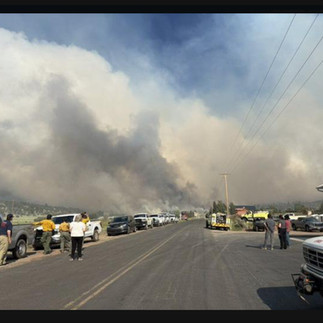Run Smart, Breathe Smarter: What Every Runner Needs to Know About Air Quality🏃♀️
- Dayna Player Robinson

- Jun 23, 2025
- 3 min read
Updated: Jun 25, 2025

🏃♀️The Air You're Breathing Matters—
Especially While Running🏃♀️
Whether you're running through the smoky skies of Southern Utah or dodging traffic fumes in a busy city, the quality of the air you're breathing during workouts directly impacts your performance and long-term health.
With wildfires flaring up again and poor air quality alerts becoming more common, this is the perfect time to talk about how air pollution affects runners—and what you can do about it.
Picture from St George News
And now you are worried about the air quality affecting your run.
You’re not alone! One of my runners recently texted me:

🌀 Why Runners Are More Vulnerable
When you run, your breathing rate can increase from 15 breaths per minute to over 60—and you’re taking in air more deeply. That means pollutants like ozone, PM2.5 (tiny particles from smoke or emissions), and nitrogen dioxide get a straight shot deep into your lungs.
You might notice:
Heavier fatigue on easy runs
Sore throat or coughing post-run
Chest tightness
Slower recovery
Or just not feeling like yourself
And the effects aren’t just short-term. Long-term exposure—especially if you run outside daily—can increase your risk of asthma, bronchitis, and even cardiovascular strain.
🔍 The Air Quality Index (AQI) Made Simple
Before you lace up, it pays to check the AQI—just like you would the weather. Here’s what the Air Quality Index means for your runs:

💡 Check real-time AQI at AirNow.gov — you can search by your zip code or city.
🌲 Let’s Talk About Wildfire Smoke
For those of us in the Western U.S., wildfire season isn’t just about heat and evacuations—it’s about breathing in microscopic ash and smoke particles, even miles from the flames. These particles (PM2.5) are small enough to enter your bloodstream and impact not just your lungs but your heart and brain too.
In fact, during smoke events, AQI can spike above 150–200, which puts everyone—not just sensitive groups—at risk. And running in it increases your exposure several fold.
NCAA Air Quality Standards for Competition
As I have spent years working with collegiate athletes, I always like to look at their standards. And Yes! Even collegiate athletes get benched when air quality drops.
The NCAA recommends canceling or modifying outdoor practices and competitions when AQI is:
Over 150: All athletes, regardless of health status, should avoid outdoor exertion.
Between 100–150: Practices should be modified, especially for athletes with asthma or other respiratory concerns.
These standards help guide coaches and athletic trainers across the country—and they should guide us recreational and competitive runners too.

What You Can Do
1. Check the Air Before You Train
Make checking AQI part of your routine—use the AirNow app or website.
2. Adjust Workouts Accordingly
Green–Yellow: Business as usual.
Orange: Shift to easy efforts.
Red or above: Take it indoors or reschedule.
3. Time It Right
Run in the early morning, when air tends to be cleaner and ozone levels are lower. You know I love the early mornings!
4. Stick to Cleaner Routes
Avoid busy roads and industrial areas. Trails, parks, and areas with trees offer better air quality buffers.
5. Use Indoor Options
Treadmill runs or cross-training indoors are smart swaps on poor air days.
6. Know Your Symptoms
Feeling off? It could be the air. Shortness of breath, chest tightness, or extreme fatigue may mean it’s time to slow down or stop.
Protect the Lungs That Power You
Your lungs are one of your most important performance tools. While we can't control wildfires or traffic pollution, we can control how we respond.
Checking the air and adjusting your training isn’t just about safety—it’s about staying consistent and keeping your engine healthy for years to come.
Let’s chase your version of awesome.
Happy running
Dayna - your fav. Exercise Physiologist & Run Coach
Set Yourself Up for Success
Want help building a smart training plan that considers air quality, recovery, and long-term progress?
That’s what I’m here for. Let’s keep you strong, injury-free, and breathing easily.
Don’t wait —schedule your running assessment or join my coaching programs today and take your running to the goal you want!
➡️ Click here to book your appointment now.
Want more help?
Join our Running Workshop here!
Or
Learn how you can run more efficiently Running Assessment
Or
Get your FREE Strength Assessment here!
Or
Join our online 12-week strength program here!




















Comments